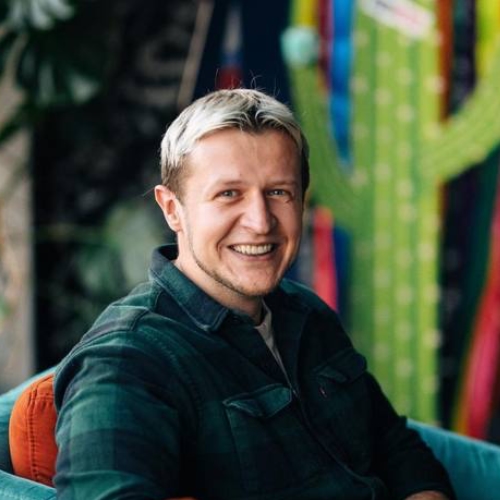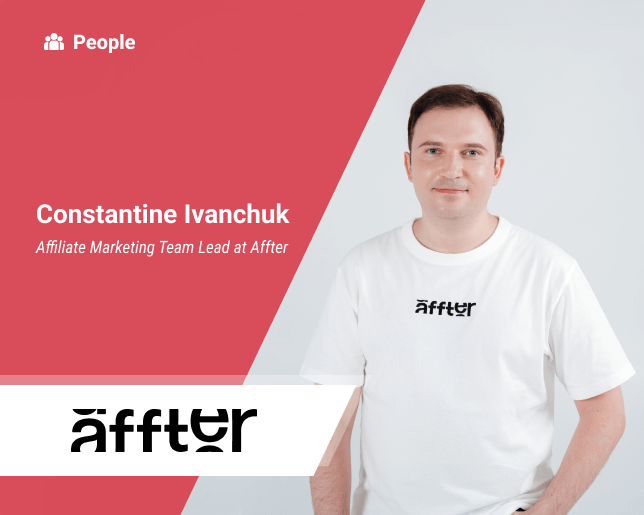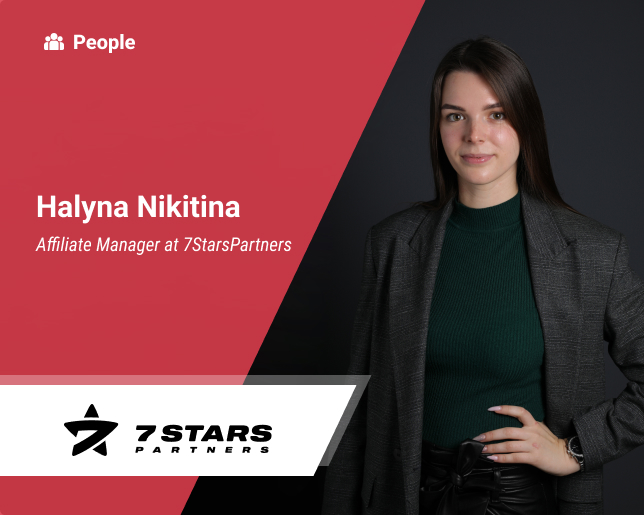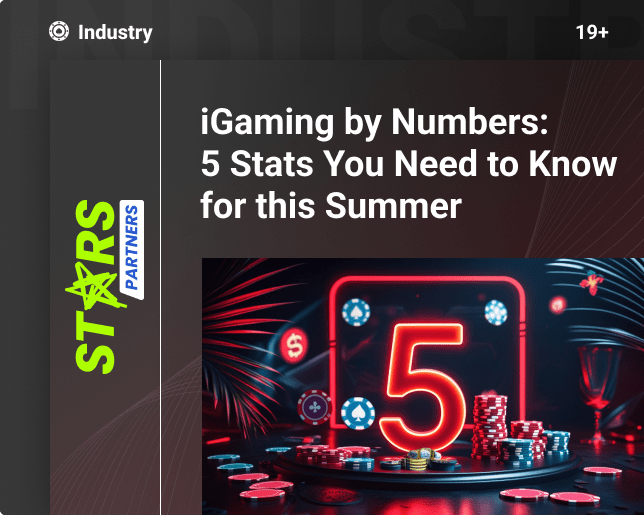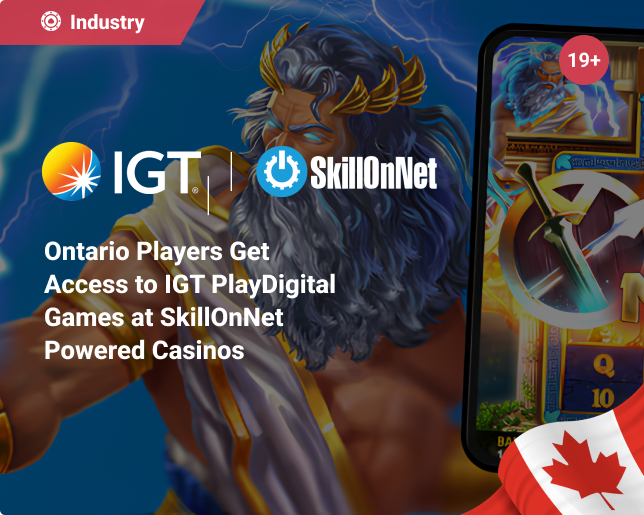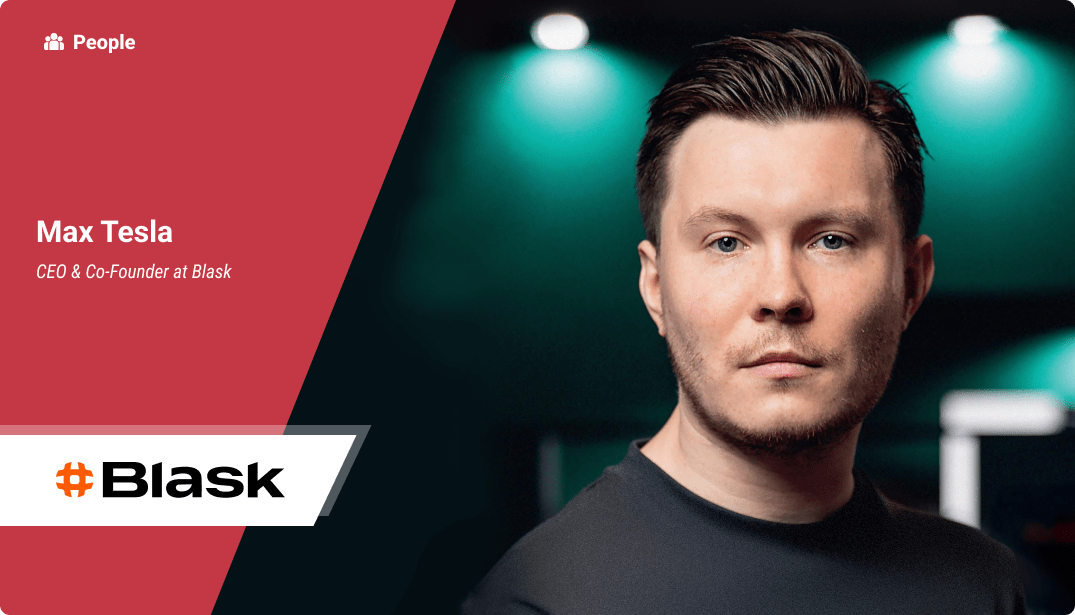
Building a New Era: Max Tesla’s Perspective on AI and Work
In today’s fast-paced world, artificial intelligence is shaping industries at an unprecedented rate, and at the forefront of this transformation is Max Tesla, CEO and co-founder of Blask. In this exclusive interview with the CasinoRIX team, Max shares his journey from a self-taught coder to a leading innovator in AI-driven solutions, particularly in the iGaming space. With a background steeped in coding from a young age and a career marked by a relentless pursuit of innovation, Max has become a key voice in the evolving conversation about AI’s role in the workplace.
Q: Hello Max! It’s great to meet you. We’re really interested in the topic of AI and place a strong focus on it. In every interview, we typically ask about the impact and use of AI in the workplace, where it’s often seen as a support tool. But with you, AI is the very foundation of your product, which we’d love to dive deeper into during this conversation. But first, let’s start with a few more personal questions. How did your career journey begin? What were your goals and ambitions back then?
A: Ah, calling it a “career” feels like a stretch – more like an obsession. I started coding at 12, and that’s when it all kicked off. Back then, I was just a kid getting a thrill from seeing lines of code come to life. My ambitions were wild, though. I wanted to build something so efficient and automated that it would render tens of thousands of jobs obsolete. Ethics? Not even on my radar. I wanted a lean, mean machine that did everything for you.
But as AI evolved and I watched the debate about machines taking over jobs heat up, my perspective shifted. The idea of completely replacing humans started to feel short-sighted. I realized that real innovation isn’t about removing humans from the equation – it’s about empowering them to do more with less hassle. That’s when I embraced supervised learning. The AI we have today, and the one we’ll see tomorrow, is a product of the sweat, code, and sheer stubbornness of hundreds of thousands of developers and researchers, each contributing to this massive, living construct.
Now I look at things differently. The goal isn’t a cold, job-killing automaton. It’s a tool that lets people focus on the creative, high-impact stuff while the machines handle the grunt work. Let’s free up minds, not replace them.
Q: Looking at your background, we see that before Blask, you spent several years working in companies related to payment solutions. Why did you decide to move away from that field? Was it a coincidence, or was it a deliberate choice?
A: When I was young and full of energy, I thought money was where money flowed – banks, payment systems, financial institutions. It made sense: if you want to swim in cash, go where the cash is, right? But as I dove deeper, I realized that while there might be a ton of money in fintech, it’s not going to land in your pocket if you’re stuck in some mid-level management role. And the tech? Ancient. The room for real innovation was close to zero. After the waves that Revolut and Stripe made, the only thing that truly shook up the space was Bitcoin, and that’s still just starting to gain steam, in my opinion.
Fintech is an amazing playground if you want to get battle-hardened: tons of data, fierce competition, and an industry where you either keep up or get trampled. I learned a lot there – how to squeeze every drop of value from metrics and optimize like a maniac. But at some point, I burned out. It stopped feeling like growth. No disrespect to fintech – there are brilliant minds doing mind-blowing things there – but I just couldn’t see myself evolving in that space. It’s like I finished the level and it was time to move on to the next boss fight. So, I left that chapter behind and set my sights on something with real teeth.
Q: As CEO and co-founder of Blask, how do you and Dmitry Belianin divide responsibilities?
A: I focus on assembling an A-team of developers and data wizards to create a product that’s nothing short of groundbreaking. Dmitry takes that product, weaves it into a compelling story, and gets it into the hands of the big players who need it. We’re like two sides of a coin. I build the rocket, and he figures out how to launch it into orbit – and, more importantly, how to make people pay for the ride. He knows how to navigate this industry like it’s his backyard. So, in short: I create, he conquers.
But that doesn’t mean Dmitry’s not creating too. The guy injected a ton of mind-blowing ideas into Blask’s roadmap and is often the voice of sanity and objectivity when we’re surrounded by a whirlwind of innovation. As for me, I’ve got years of growth experience under my belt – managing product, marketing, and PR in a 50/50 split. Plus, I’ve got a killer sense of style and a huge visual library in my head. To make something truly great, you’ve got to grind hard and do it with flair. Put in the sweat, but make sure it looks effortless. That’s how you go from good to damn legendary.
Q: Who originally came up with the idea for Blask? Can you share a bit about how it all started, your partnership, and why you decided to create a solution for the iGaming industry? Was there a gap or specific need in the market?
A: The original spark came from Dmitry. He messaged me for months, insisting he had this breakthrough idea that could totally disrupt the industry. At first, I had no clue what he was talking about – iGaming wasn’t on my radar at all. But then we sat down, he laid out his vision, and it clicked. I instantly knew which of my friends I needed to call to pull it off – and we did just that.
Dmitry and I go way back, over eight years now. I’ve lost count. We’ve always crossed paths on smaller joint projects, and every time, the results were stellar. The gap in the market was enormous. It felt like we were staring at a digital Stone Age, ready to inject some real tech muscle into an analytics space that was basically stuck in the prehistoric era. Dmitry had advisors from the industry who saw the potential, and as a veteran himself, he knew exactly how painful it was to get solid data and insights. He’d been burning through tens of thousands of man-hours on research for his own teams. So Blask was built not just to fill a gap, but because it was something he personally needed.
It’s a rare kind of alignment – when you’ve got the tech, the industry know-how, and a product that solves real headaches for the people creating it. That’s why it works.
Q: What makes a product built on AI truly unique?
A: There’s nothing inherently unique about an AI product. Just because it’s got “AI” slapped on it doesn’t mean it’s special. Dmitry shot me a message the other day about HubSpot’s new gimmick called Agent.ai. They describe it as “a marketplace and professional network for AI agents and the people who love them. Discover, connect with, and hire AI agents to do useful things.” To me, it’s just some useless, stillborn project replicating OpenAI’s Explore GPTs feature. HubSpot must be sitting on too much cash if they’re chasing hype like that. I see zero “uniqueness” there, let alone “truly unique.”
AI isn’t some magic wand that fixes everything; it’s a messy black box filled with entropy and unpredictability. At Blask, we don’t treat AI like some holy grail. It’s just another tool in our arsenal – one that we use only if it’s the fastest, cheapest, and most efficient way to solve a problem. Doesn’t matter if it’s an API call to a proprietary LLM, deploying a detection-transformer model for computer vision, or NLP – we pick what works.
What actually makes a product unique? It’s not AI. It’s a killer value proposition, nailing product-market fit, kickass marketing, rock-solid partnerships, and – most importantly – users who have real problems solved by it. Remember how you used to call a taxi by phone? Exactly. You don’t anymore. Guess why? No AI in sight, just a damn good product that transformed an industry. That’s where the magic happens.
Q: Besides being AI-driven, what other competitive advantages does your product offer?
A: Look, I’m honestly exhausted from rattling off Blask’s competitive advantages to every journalist, analyst, and random guy at conferences. Within a year or two, everyone’s going to be using it anyway, so they might as well read our kickass blog, follow us on socials, or – better yet – book a demo and have a chat with Greg, our CRO / Customer Success guy. He’ll walk them through the whole shebang. Seriously, it’s not a state secret – it’s all out there, on the Internet.
But since we’re here, let me give you a glimpse. First – being AI-driven, is not a competitive advantage. Take the Blask Index, for instance: political unrest in Bangladesh? Blask picks it up and maps its ripple effects. Every single IPL 2024 match? Reflected in our index. If there’s a shift in the iGaming cosmos – whether it’s squeaky-clean onshore brands or murky offshore players – you’ll see it all in one click. Imagine going from the dark ages of scattered info to having the entire industry landscape at your fingertips. And don’t even get me started on our AI predicting FTDs and GGR at both brand and industry levels. It’s like going from smoke signals to fiber optics. And it’s just 5% of our roadmap. We’ve not even started yet.
But our true edge? It’s when partners come to us saying, “Hey, Blask is amazing, but we need something even crazier for our use case.” That’s when we light up. We’ve eaten a lot of data dogs (no, it’s not a paid mention of Datadog Inc.), and these custom on-demand, on-premise solutions are where our team shines. Blask isn’t just a product – it’s a crew of seriously talented, adaptable people who see this as more than just business. It’s our religion. We live and breathe this stuff, and we’re ready to tackle any challenge you throw at us.
Q: How do you choose which aspects of your operations rely on AI versus human input?
A: Everything goes through human input. Who the hell decided AI is supposed to run the show and make decisions on its own? What, did someone pull that idea out of a book, some random blog post, or a hot take on Twitter? Did I miss a memo somewhere? Oh wait, I’m not even on social media – just LinkedIn, and that’s because our marketing team strong-armed me into it. Trust me, maintaining that profile is already a full-time grind. And even there is a place for human supervised AI.
I’m not here to preach ethics to anyone, but outputs from AI are a tool to assist humans, not replace them. Look up supervised learning – it’ll clear things up real fast. AI cranks out results, but at Blask, every output goes through human supervision and sanity checks. We don’t blindly trust the machine, and anyone who does is either reckless or has been reading too much science fiction. So yeah, the bots work for us, not instead of us.
Q: Since data and statistics are so vital and often confidential for companies, have you encountered any concerns or mistrust regarding AI solutions?
A: I’m not sure I get the premise of the question. Yes, data and stats are critical because companies base their decisions on them. And yeah, private data is super confidential – data’s the new gold and oil rolled into one. But what’s that got to do with mistrust in AI? If you’re talking about concerns, it’s not really about AI – it’s about the data itself.
There’s been a long history of people being suspicious of data, and often for good reason. Look at how some rating agencies got caught red-handed manipulating facts. Need a classic example? The 2008 financial crisis, where those agencies rated junk mortgages as safe investments, tanking the entire economy. Or take the cosmetics industry – companies fund “research” to back up whatever claim they want to slap on a new cream. They’ll point to studies saying some collagen-infused goo will shave 10 years off your face, but guess what? They paid for those results. There’s a reason people are skeptical.
Have I personally run into mistrust? All the time. Even at Blask. Our clients and partners are some of the smartest, most calculating minds out there, and they question everything. And that’s how it should be. In today’s world, if you’re not critically evaluating the information in front of you, you’re setting yourself up to be someone’s fool.
But here’s the thing: we welcome it. Because if you can poke holes in our methods, find inconsistencies, or suggest a better approach, that just makes us sharper. In the end, skepticism isn’t a roadblock – it’s how you build real trust.
Q: In your view, when do you think we’ll see a widespread shift toward AI solutions?
A: Only God knows that one. I’m not a fortune teller. AI is way too multifaceted to make blanket predictions. Take object detection – years ago, it was mind-blowing. Spotting faces, cars, all that stuff? Big deal. Now? It’s used to count healthy vs. diseased oranges on a farm using drone footage. Reality check: what was once revolutionary is now just another tool in the shed.
And if you’re really into predictions, look up Gartner’s Hype Cycle. Those guys have a knack for charting out the tech landscape and separating short-lived hype from real trends. But here’s the kicker – AI is already shifting industries in different ways. Some applications are already commoditized, others are stuck in perpetual research, and some might never see the light of day outside academia.
You want a fun fact? Modern cryptocurrencies rely on elliptic curve cryptography – a concept developed in the 1600s by Pierre de Fermat and later refined by other mathematicians centuries later. It’s wild when you think about it: we’re building today’s most advanced tech on the foundations laid 400 years ago.
The shift isn’t coming; it’s already here. The real question is how far we’ll take it before the next big buzzword rolls in.
Q: Blask is currently in the MVP/early access phase. When do you expect the full-scale release?
A: Let’s keep that one a big surprise, shall we? I promise it’ll be worth the wait 🌚
Q: Can you share some of your plans for Blask’s future development?
A: Absolutely! Right now, we’re working on our game detection feature, and it’s already a beast. We can identify tens of thousands of slot games in real-time on casino websites. This will lead to action-driven insights. Imagine you’re a casino operator in Brazil – one quick look at Blask, and you realize that if you don’t have Fortune Tiger on your site, you’re in some serious FOMO territory. Missing out isn’t an option when the data’s telling you exactly what you need to be in the game.
We’re also rolling out indices for leagues and sports, applying our own 3i metrics: Impact, Importance, and Interest. It’s like Blask Index but for leagues, teams, and tournaments instead of countries and brands. Want to know what’s bigger in Ghana – the Champions League or Italy’s Serie A? We’ll have the answers. Spoiler alert: Ghana’s fanbase is heavily skewed towards the English Premier League. In fact, more than 65% of football-related searches in Ghana are for Premier League teams .
Next up, even sharper and more precise calculations. We’re not just relying on sanity checks and experts; we’re planning to extract a ton of metrics from gambling commission reports, regulators, and publicly listed companies. It’s like mining data gold out of massive PDFs.
And that’s just the start. We’ve got some wild ideas cooking up, from optimizing marketing mixes to deep dives into competitive analysis and more. Stay tuned, because Blask is going to redefine how you look at iGaming data.
Q: Is Blask your sole focus right now, or are you working on anything else?
A: From a business standpoint – absolutely, Blask has my full attention. But I’ve also started putting a lot of focus on myself. Counting calories, tracking protein intake, working out daily, and hitting 12,000 steps every single day. It’s a game-changer. Keeps me grounded, sharp, and loaded with energy. These habits aren’t just about fitness; they’re about mental clarity and building a sustainable pace. Highly recommend it to anyone trying to stay at the top of their game. After all, what’s the point of crushing it at work if you’re not at 100% personally?
Q: Startups can be incredibly demanding. How do you recharge, and what keeps you motivated to keep pushing forward?
A: The lifestyle stuff I mentioned earlier is key – working out, hitting my daily goals, and staying on top of my nutrition keeps me charged. But there’s more to it. Switching gears and changing focus when I need a mental reset really helps. And, above all, it’s the people.
Seeing the impact we’re making, getting great feedback (or even the tough kind) – that’s what fuels the fire.
I remember when I was pursuing a bachelor’s in Music Production, my mentor said something that stuck with me: “Never get upset when someone says your track reminds them of something. That’s a good thing – it activates the right neural pathways in their brain. What’s worse is when it doesn’t remind them of anything.” Art is cyclical, and I’ve applied this to how I handle feedback. When I say I love both great and not-so-great feedback, that’s what I mean – it’s about shifting your perception. It’s not a comparison game; it’s a paradigm shift in how you see growth.
And you’ve got to travel. We’re in an era where it’s cheaper and more accessible than ever, unlike what our parents had. Different cultures bring different perspectives and values. Blask itself is multicultural and diverse, and when you open yourself up to new worlds, those worlds open up to you. It’s energizing on a whole new level.
Oh, and I’ve got a thing for tearing up the off-road trails on a tour-enduro bike with my wife. Nothing like a roaring engine on off-road to reset your mind and keep you hungry for more.
And let’s not forget your roots – never lose sight of where you come from and stay connected with your parents. That’s super important. Same goes for friends – they’re your anchor and your reality check. Life has to be full. It’s up to you to decide how to fill it, but make sure it’s packed with what truly matters. Work hard, play harder, and keep the people who’ve been with you from the start close. That’s where the real balance comes in.
Q: Thanks again for your time! One last question – since we’re talking about the iGaming industry, do you play at casinos yourself? If so, what’s your biggest win?
A: Thanks a lot, you guys had some really great questions – super engaging and emotional. I honestly haven’t had an interview like this in ages… maybe ever. I really enjoyed answering them. And I also want to apologize if I came off a bit rough or arrogant in question 6 with the demo jab and all that “find it on the website” stuff. That wasn’t my intent. Staying hungry, staying foolish.
As for playing in casinos – oh yeah, I’m definitely a gambling man, but my game is poker. Love it. We’ve got a whole crew we play with in the evenings. It doesn’t happen as often as I’d like these days – everyone’s a bit worn out, and we need to find our rhythm again. But don’t worry, the poker nights will be back. It’s not just about the cards; it’s the adrenaline, the camaraderie, and the thrill of the game. Nothing quite like it.
Other news:
Inside Affter: Constantine Ivanchuk on Industry Influence and Motivation
Discover the world of iGaming through the eyes of Constantine Ivanchuk, a seasoned media buyer. From his early career journey to his role at Affter and the evolving industry landscape, Constantine offers a unique pers...
Navigating the iGaming Galaxy: Insights from Halyna Nikitina, Affiliate Manager at 7StarsPartners
Halyna Nikitina, the Affiliate Manager of the 7StarsPartners team, recently shared insights into her role with the CasinoRIX team.
iGaming by Numbers: 5 Stats You Need to Know for this Summer
Summer changes how players engage with iGaming. Stars Partners reveals 5 key stats, from a 42% spike in mobile use to shorter sessions and shifting GEOs, that every affiliate should know. Adapt your strategy for highe...
Ontario Players Get Access to IGT PlayDigital Games at SkillOnNet Powered Casinos
It’s good news for customers in Ontario because SkillOnNet has extended a content deal with IGT PlayDigital for the Ontario market.
